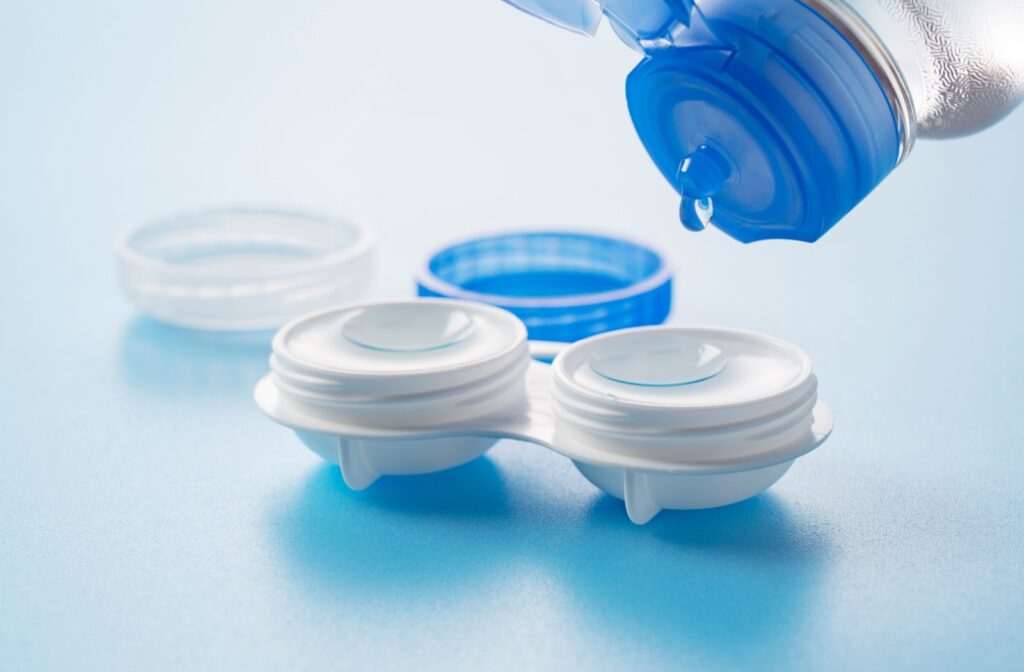If you wear contact lenses, you’ve likely noticed the expiration date on the packaging. But have you ever wondered why your lenses even have an expiration date in the first place?
An expiration date is not merely a suggestion, but is actually a crucial consideration in maintaining your eye health. The lifespan of a contact lens is determined so as to ensure that it remains safe and effective to use.
Using lenses past their expiration date is risky. It’s important to understand why these dates are set and what they mean for your eye health.
Contact Lens Packaging & Sterility
Contact lenses are packaged in specially designed blisters filled with a saline solution. This sterile environment is vital for keeping the lenses safe from contaminants.
Contact lens packaging is engineered to maintain sterility until the lenses are opened. Over time, however, even the most sophisticated packaging can fail, allowing bacteria to infiltrate its contents.
Proper packaging ensures the lenses stay hydrated and comfortable. Once the integrity of the blister pack is compromised, the protective saline solution around the lenses can evaporate, causing them to dry out and become unusable.
How Long Can Contact Lenses Be Stored?
The time frame for which you can store your contacts varies depending on the type and brand of lens. Soft contact lenses generally have a shorter shelf life compared to rigid gas-permeable ones.
Store lenses in a cool, dry place away from direct sunlight. Proper storage conditions can help extend the life of your lenses within the indicated expiration date.
Always adhere to the manufacturer’s guidelines for storage to ensure that the lenses remain safe to use.
Can You Wear Out-of-Date Contact Lenses?
Wearing expired contact lenses is not recommended. While it might be tempting to use lenses past their expiration date to save money, doing so can put your eye health at risk.
Expired lenses may have compromised sterility and material integrity, making them unsafe to wear.
Using out-of-date lenses can lead to:
- Discomfort
- Reduced visual clarity
- Potential eye infections
The risks associated with wearing expired lenses far outweigh the benefits. It’s always best to replace expired lenses with new, safe ones.
Potential Risks of Using Expired Contact Lenses
Wearing expired contact lenses can lead to several health risks.
Eye Infections
One of the most significant dangers of wearing expired contacts is the potential for eye infections. Bacteria and other microorganisms can contaminate lenses that are past their expiration date, leading to infections that can be painful and damaging.
Allergic Reactions
Expired lenses can also cause allergic reactions or irritations. The materials in the lenses can degrade over time, causing them to break down and release particles that may irritate the eyes. Wearing expired lenses can result in redness, itching, and discomfort.

Does Contact Solution Expire?
Just like contact lenses, contact solutions also come with expiration dates. These dates are set to ensure that the solution remains sterile and effective.
Using expired solution can introduce harmful bacteria to your lenses, increasing the risk of infections. It also loses its efficacy when disinfecting contacts, making them unsafe to wear. Check the expiration date on your contact solution and replace it as needed.
Using fresh, unexpired solution is essential for maintaining the sterility and safety of your lenses.
Best Practices for Storing Your Contact Lenses & Solution
Proper storage of both contact lenses and cleaning solution is important for maintaining their safety and efficacy.
- Store your lenses in a clean, dry place away from direct sunlight.
- Temperature fluctuations can affect the materials in the lenses, so keep them in a stable environment.
- Ensure that your contact lens case is clean and replaced regularly. A dirty case can harbor bacteria, increasing the risk of infections.
- Store your contact solution in a cool, dry place and keep the bottle tightly closed when not in use.
Following these best practices helps extend the life of your contact products and ensures they remain safe for use.
Tips to Extend the Life of Your Contact Lens Products
To get the most out of your contact lens products, follow these simple tips.
- First, always wash your hands thoroughly before handling your lenses or solution. This prevents the transfer of dirt and bacteria to your eyes.
- Use fresh contact solution every time you store your lenses. Reusing old solution can introduce contaminants and reduce its effectiveness.
- Avoid exposing your lenses to water, as this can lead to contamination and infections.
Need New Contact Lenses?
Taking care of your eyes means paying attention to the expiration dates of your contact lenses and solutions. From understanding the role of packaging and sterility to recognizing the signs of expired products, being informed helps protect your eye health.
Follow best practices for storage and replacement to ensure your lenses and solutions remain safe and effective.
Remember, your eyes deserve the best care. Trust in fresh, unexpired products for optimal eye health. If you have any questions or need guidance, book an appointment with Alaska Eye Care Centers.



